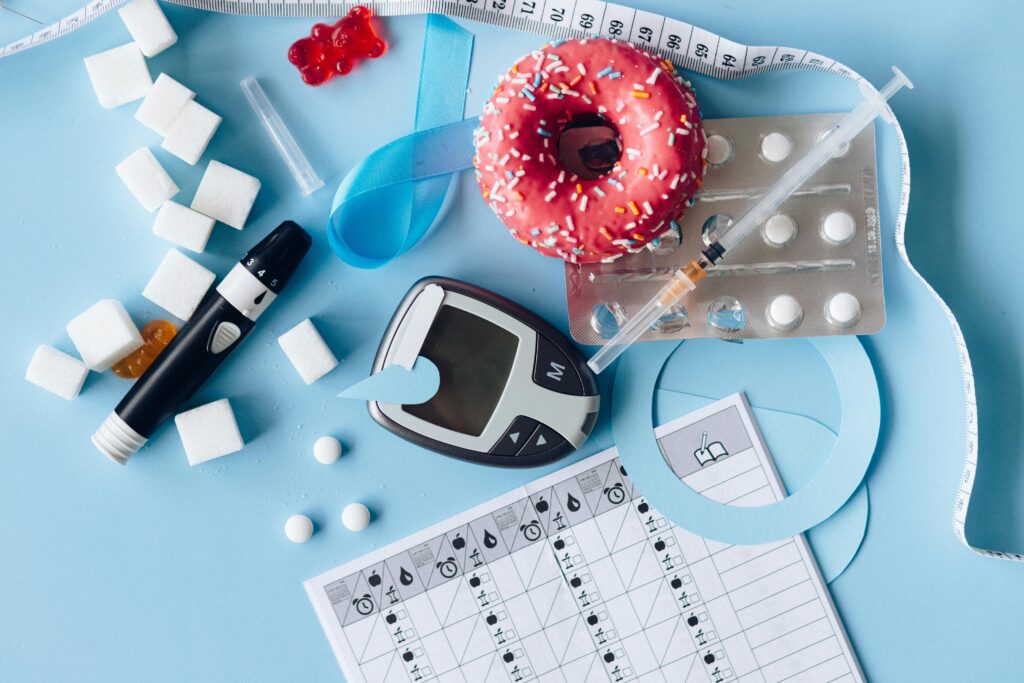Diabetes (a disease in which blood sugar is high) is a chronic lifelong condition. Broadly speaking, diabetes can be divided into two types. Type 1 diabetes occurs when the insulin-producing cells in the pancreas are destroyed by the immune system (autoimmune). Type 2 diabetes occurs in people who are generally overweight or inactive and have a genetic predisposition to develop diabetes. Insulin is a hormone made by the pancreas to help our body utilize sugar (glucose). Patients with type 2 diabetes are insulin resistant, i.e. their pancreas makes insulin, but their cells, tissues, and organs (liver, muscles, etc.) do not respond to it. This ‘resistance’ requires the body to produce more insulin to control blood glucose levels. Over time, insulin stores in the pancreas are depleted and blood glucose becomes difficult to control. Often multiple medicines and ultimately insulin injections are needed to keep blood sugars under control, especially after meals. Early treatment and aggressive weight loss can help prevent complications in most individuals.
Depending on the stage and severity of diabetes, your doctor will recommend a treatment plan to keep your sugars in control and reduce the risk of diabetes-related complications. A balanced and healthy diet is very important and a lower intake of high-fat or high-carbfood is recommended.
If lifestyle changes, such as diet and exercise are not sufficient in improving blood glucose (BG) control, your healthcare provider may recommend medication(s) to help control diabetes. Medications for type 2 diabetes work through different mechanisms to counter the underlying defects of glucose metabolism at various levels and in different organs.
Medications
- ♣ Metformin (Biguanides):
- This is the first medicine used in most cases and works on the liver to reduce sugar levels.
- It may cause some weight loss but may also cause an upset stomach.
- Your doctor may start metformin once daily (usually after supper) and gradually increase the dose as needed.
- It should not be taken if kidney function is compromised and should be withheld for 48 hours after surgeries or CT scans.
- ♣ SGLT-2 Inhibitors:
- This class of medications (e.g. Invokana®, Farxiga®, Jardiance®, Steglatro®) work in the kidneys and help excrete sugar through the urine.
- SGLT-2 inhibitors improve BG and may lower blood pressure, cause some weight loss, and do not cause low blood sugar. They are also beneficial for heart and kidney functions.
- Local yeast infections (in the genital area) may occur and rare cases of DKA (diabetic ketoacidosis) have been reported.
- If your oral intake is very low or you are not eating, you will need to stop the medicine temporarily.
- ♣ GLP-1 analogs (Bydureon®/Victoza®/Trulicity®/Ozempic®/Rybelsus®):
- These agents slow the absorption of carbsand reduce appetite.
- Many patients lose weight. Some patients may complain of nausea in the first weeks of use.
- Very rarely, a serious complication called pancreatitis (causing severe abdominal pain) may occur.
- In animal studies, thyroid cancer was seen rarely.
- GLP-1 analogs reduce heart-related complications in patients with diabetes. They are given as injections, via disposable pens (just under the skin via prefilled pen-like devices), usually once a week.
- Rybelsus® is the only one in this category which is a tablet.
- ♣ Actos® (Pioglitazone):
- Actos improves insulin resistance and lowers blood fat levels in many patients.
- If used early, it may slow down the deterioration of the insulin-producing capability of the pancreas.
- It can cause weight gain, fluid retention, and increased risk of fractures of small bones.
- It should not be used if a patient has congestive heart failure or is at increased risk of heart failure.
- In some studies, long-term use of higher doses of pioglitazone was linked to an increased risk of bladder cancer.
It is usually taken once a day with breakfast.
- ♣ Sulfonylureas:
- They stimulate the release of insulin from the pancreas.
- These medications should be taken once or twice a day (before a meal).
- Since they may deplete existing insulin stores in the pancreas, they should be avoided if blood sugars are not too high. They can cause severe hypoglycemia.
- They can cause weight gain.
- They should be avoided in older patients and those with kidney disease.
- Examples: Glimepiride, Glipizide, and Glyburide.
- ♣ Meglitinides:
- They stimulate the release of insulin from the pancreas, but for short periods of time. They should be taken one to three times a day (before meals).
- If you do not eat a meal, you should not take the medicine.
- Examples include Prandin® (repaglinide) or Starlix ® (nateglinide).
- ♣ DPP-4 Inhibitors (Januvia®/Onglyza®/Tradjenta®/Alogliptan):
- These are often used with other diabetes medicines, have few side effects and do not cause hypoglycemia (low BG).
- They are more effective in lowering BG peak after meals.
- These medications are usually taken once daily and may be taken in the morning or evening (before or after a meal).
- Side effects are uncommon but acute pancreatitis may occur rarely.
- ♣ Insulin:
- Insulin is the most effective agent to lower BG. If BG levels are really high, or diabetes has been present for >6-8 years, insulin production from your pancreas may be too low. Therefore “pills” may not be able to keep your BG under control (particularly after meals) and you may have to add insulin to your regimen. Your doctor will recommend the best combination depending on the severity of your diabetes (see our blog on insulin therapy).
Your HCP will design a medicines combination regimen needed to help maintain BG levels and prevent a decline in pancreatic function. If you follow a balanced diet, exercise regularly, and take your prescribed medications, you can keep your BG in control and prevent development of diabetes complications.
Diabetes is a chronic disease. By taking charge, you can control it and prevent all of the complications of diabetes. American Diabetes Association (www.diabetes.org) has many publications and other tools that may help you control your diabetes. Good luck!
Post Disclaimer
We are not your healthcare provider, and your use of this website does not establish a patient-client relationship. All the information contained on this website is for informational purposes only. No material on this site is intended to be a substitute for professional medical advice (diagnosis, treatment, testing or nutritional information). Always seek the advice of your physician or qualified healthcare provider with any questions you may have regarding medical or health-related conditions or treatment. Your healthcare provider knows your condition or situation well and can give you specific advice which would be appropriate for your condition/situation. Your healthcare provider can also guide you more accurately about injection techniques, dietary interventions and the use of medical technology that is most pertinent and suitable for you. Please do not disregard professional medical advice or delay in seeking it because of something you may have read on this website.

